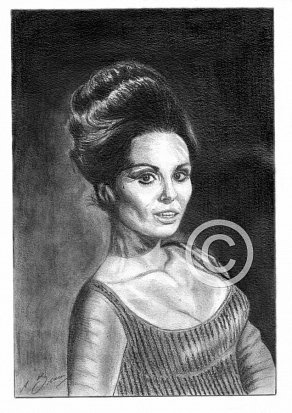Daliah Lavi
Pencil Portrait by Antonio Bosano.

Shopping Basket
The quality of the prints are at a much higher level compared to the image shown on the left.
Order
A3 Pencil Print-Price £45.00-Purchase
A4 Pencil Print-Price £30.00-Purchase
*Limited edition run of 250 prints only*
All Pencil Prints are printed on the finest Bockingford Somerset Velvet 255 gsm paper.
P&P is not included in the above prices.



Comments
With the huge success of the James Bond film franchise, starting with “Dr No” in 1962, a plethora of spin-offs appeared throughout the 1960s. They followed the original recipe of exotic locales, an evil genius who wishes to take over the world, a laidback, oversexed super spy hero and a bevy of (mostly treacherous) beautiful women. Among the actresses portraying the last of these was Daliah Lavi, who sadly passed away this year at the age of 74.
Almost all Lavi’s film career took place in that swinging decade when she was most likely to be seen in miniskirt and kinky boots, or displaying her underwear. The multilingual Lavi (born in the British Mandate of Palestine) had already made several French, German, Italian and Hollywood films before she starred as a sexy double agent opposite Dean Martin in “The Silencers” (1966), the first of the “bosoms and bullets” Matt Helm series.
The following year, and with her tongue firmly in her cheek, she was one of the plethora of 007s in “Casino Royale” (1967) and, with her dark hair in a high beehive, was an alluring and mysterious woman who runs a gambling house in London in the cold war thriller “Nobody Runs Forever” (1968). The run of spy spoofs ended with “Some Girls Do” (1969), in which she was a villain, opposing and attracting “Bulldog” Drummond (Richard Johnson) in equal measure.
After a turn as a furious Mexican woman scorned by an outlaw (Yul Brynner) in the western “Catlow” (1971), Lavi deserted the silver screen and began a whole new career as a singer. The Israeli actor Topol (of “Fiddler on the Roof” fame), had persuaded her to make recordings of Hebrew songs for the BBC in 1969. In the 70’s she would soon become one of the most popular singers in Germany, her biggest hits being Oh Wann Kommst Du? (Oh, when will you come?) and Willst Du Mit Mir Gehen? (Do you want to go with me?).
Yet for all her commercial appeal, her cinematic career could have been more highbrow. As the beautiful Italian woman causing friction between a washed-up movie star (Kirk Douglas) and a temperamental newcomer (George Hamilton) in Vincente Minnelli’s “Two Weeks in Another Town” (1962) – shot in Italy – Lavi won a Golden Globe award as the most promising female newcomer. Nevertheless, with her beautiful high cheekbones, flashing dark eyes and olive skin, she certainly had presence and I remember her with affection. A class act, stylishly attired and thankfully tattoo free.
She was born Daliah Lewinbuk in the village of Shavi Zion in what was to become Israel. Her Jewish parents, Reuben and Ruth, were Russian and German respectively. A full decade before she starred alongside him, Daliah met the Hollywood star Kirk Douglas, who was making The Juggler near the Lewinbuks’ village.
Discovering that the then ten year old wanted to become a ballet dancer, Douglas arranged for her to get a scholarship to study ballet in Stockholm. However, after three years she was advised to give up dancing because of low blood pressure. It was then that she switched her ambitions to acting, making her first screen appearance while still a teenager in Arne Mattsson’s “The People of Hemso” (1955), a Swedish production based on the August Strindberg novel.
After her 60’s heyday and a turn as a furious Mexican woman scorned by an outlaw (Yul Brynner) in the mediocre western “Catlow” (1971), Lavi deserted the silver screen and began a whole new career as a singer. She was fluent in several languages, including English, Swedish,French, Italian, Hebew and Arabic yet henjoyed her greatest commercial success singing in german. The Israeli actor Topol had persuaded Lavi to make recordings of Hebrew songs for the BBC in 1969. She soon became one of the most popular singers in Germany, her biggest hits being Oh Wann Kommst Du? (Oh, when will you come?) and Willst Du Mit Mir Gehen? (Do you want to go with me?).